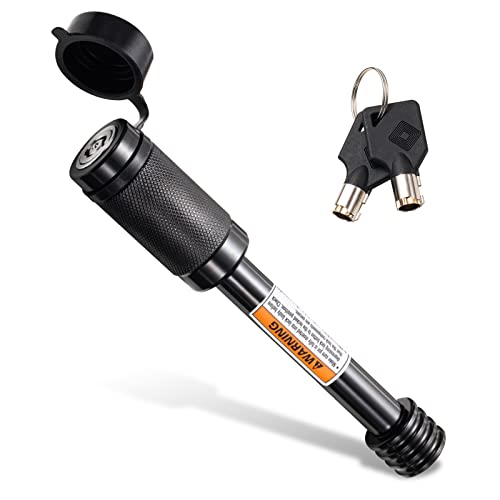
BOLT 7023582 5/8" Receiver Lock for Chevrolet, GMC, Buick and Cadillac Center Cut Keys
ANDERSEN HITCHES | Rapid Hitch | Heavy Duty Trailer Locking Pin Set with Keys | Stainless Steel Lock...
Tyger Solid Black Hitch Pin Lock with Key fits 5/8inch Pin Holes on 2inch Hitch Receiver | Load Rating...
Valuable Tips When Choosing Locking Trailer Hitch Pins
Choosing a locking trailer hitch pin is an essential step in ensuring the safety of your trailer and its contents. This guide provides helpful tips and considerations to keep in mind when selecting a locking trailer hitch pin in the Exterior Accessories category to help secure your trailer and prevent theft.
1. Determine the Type of Hitch Receiver
The first step in choosing a locking trailer hitch pin is determining your trailer's type of hitch receiver. The two most common hitch receiver types are the standard hitch receiver and the receiver hitch lock. The standard hitch receiver is also known as the uniball hitch and is compatible with trailers with a 2-inch ball. On the other hand, the receiver hitch lock is compatible with trailers with a 1-7/8-inch ball.
When selecting your locking trailer hitch pin, ensure that it is compatible with your trailer's hitch receiver type. Determine the hitch receiver type and size before purchasing a locking trailer hitch pin to prevent any compatibility issues.
2. Check for the Pin Dimensions
The dimensions of the locking trailer hitch pin are essential to ensure proper installation and optimal security. The dimensions of the locking trailer hitch pin refer to the length and diameter of the pin. The length of the pin determines the amount of space available between the ball mount and the trailer hitch. The diameter of the pin refers to the thickness of the pin used to secure the trailer and prevent theft.
Before purchasing a locking trailer hitch pin, ensure that it matches the dimensions of your trailer hitch. The appropriate size is crucial to ensure a secure fit and prevent any incidents while towing.
3. Consider the Material of Construction
The material used to construct the locking trailer hitch pin is an essential consideration when selecting one. The most common materials used are steel, stainless steel, and aluminum. Each of the materials has its advantages and disadvantages.
Steel locking trailer hitch pins are strong and durable, but they are prone to rust and corrosion. Stainless steel locking trailer hitch pins are also strong and durable but are resistant to rust and corrosion. On the other hand, aluminum locking trailer hitch pins are lightweight and resistant to rust and corrosion but have a lower weight capacity.
The material of construction is a personal preference but ensure that it is durable and corrosion-resistant to ensure optimal security and longevity.
4. Consider the Locking Mechanism
The locking mechanism is the critical component of a locking trailer hitch pin. The locking mechanism is responsible for securing the trailer and preventing theft. There are two main types of locking mechanisms: key-operated locking mechanism and combination locking mechanism.
The key-operated locking mechanism requires a key to lock and unlock, which provides optimal security but may require frequent key replacement in case of loss. On the other hand, the combination locking mechanism uses a combination code to lock and unlock, which eliminates the need for frequent key replacement but may be less secure than a key-operated lock.
Consider the locking mechanism that suits your needs and preference when selecting a locking trailer hitch pin. Choose a locking mechanism that you find easy to use and provides optimal security to your trailer.
5. Consider the Weight Capacity
The weight capacity of the locking trailer hitch pin is another crucial consideration when selecting one. The weight capacity of the hitch pin refers to the maximum amount of weight the hitch pin can withstand without sustaining any damages.
Ensure that you select a locking trailer hitch pin that can accommodate the weight of your trailer and its contents. Overloading the hitch pin can lead to accidents while on the road, compromising your safety and that of other motorists.
6. Read the Reviews
Before purchasing a locking trailer hitch pin, read the reviews of the product from other users. Reviews from other users can provide valuable insight into the product's strengths and weaknesses, performance, and durability.
Reading reviews can also provide any potential compatibility issues, helping you make an informed purchase decision. Consider purchasing a locking trailer hitch pin that has a higher rating and positive reviews to ensure that it meets the necessary requirements and provides optimal security.
Conclusion
Choosing a locking trailer hitch pin is an essential step in ensuring the safety and security of your trailer and its contents. The tips and considerations outlined above will guide you in selecting a locking trailer hitch pin that meets your towing needs and provides optimal security. Consider the hitch receiver type, pin dimensions, material of construction, locking mechanism, weight capacity, and user reviews when selecting a locking trailer hitch pin to ensure a secure and safe towing experience.
Related Topics You Might Like



















